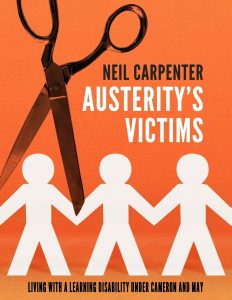Austerity
 When being poor seems inevitable
When being poor seems inevitable
As a volunteer advocate, Neil Carpenter was struck that people with learning disabilities endured financial hardship as a matter of course, so decided to investigate. Through the experiences of five men, he tells stories of routine poverty and injustice wrought by austerity
Since 2010, successive governments have made it a priority to ‘clear up the financial mess left by Labour’ through a wide-ranging programme of austerity measures intended to reduce the deficit.
As those cuts were biting, I began working as a volunteer advocate for adults with a learning disability, going into day centres, running a drop-in advocacy session and visiting people in their homes.
My book, Austerity’s Victims, published last year, is based on that experience and was triggered by my initial impression that nearly everyone I met seemed poor – as if poverty was an almost inevitable part of having a learning disability.
I wanted to see if that impression of poverty was accurate. The book is a detailed account of what emerged and aims to bring the injustice experienced by people with a learning disability into the open.
It concentrates on five men in Cornwall – Mark, Les, Thomas, Danny and Frank (all names have been changed) – all of whom are different in a number of ways.
Bitter at life
The men’s ages range from below 30 to over 60. Mark is in his late 20s and his life, particularly his accommodation, lacks any planned stability. Les, nearing pension age, was born with brain damage and is often bitter at what life has brought him. To use his own words: ‘I didn’t ask to be bloody born like this.’
Family support for them varies from nothing to the comprehensive back-up received by Thomas who has Down’s syndrome. In his early 40s, he lives on his own but his parents provide strong support which is a key factor in the quality of life he enjoys.
Danny suffered a life-changing brain injury in 1980 in a motorbike accident but has managed to piece his life together again; he is included in the book because day centres and advocacy organisations make no major distinction between people with acquired brain injury and those with learning disabilities.
Mark and Danny attend a day centre while the others receive support at home. One of them is Frank: autistic and very unobtrusive, he withdraws into near-invisibility in his neighbourhood.
Low income gets lower
In these five case studies, the men’s spending is compared not just with UK and Cornwall medians but also with the Joseph Rowntree Foundation’s minimum income standard. This is ‘what you need in order to have the opportunities and choices necessary to participate in society’ or, more bluntly, ‘a minimum is about more than survival alone’.
” The world does not feel on his side, with each year – or each month – tearing a new hole in the fabric of support”
The men’s spending averages 48% of the UK median, 55% of the Cornwall median and 71% of the minimum income standard. It goes without saying that their income is below the relative poverty threshold.
From the case studies, additional common features stand out.
All the men have had their support hours at home or their day centre attendance cut. The three who have support hours have seen them reduced by an average of 27%. Only half of Mark’s day centre place is now funded; Danny has had all his adult social care funding taken away.
When the book was published, two of the five men had had their benefits cut. Frank could not get his disability living allowance transferred to a personal independence payment. Danny was suddenly deemed, 36 years after his motorbike accident, to have miraculously changed and therefore be fit for work without his employment and support allowance (ESA). Thomas has also fallen foul of the system by being moved to the work-related activity group.
To state the obvious, their quality of life has suffered. With limited opportunity to go out and mix with others, they lack the friendships that most of us take for granted. Loneliness is a real problem; as Les says time and time again: ‘It’s the evenings I can’t stand.’
 Truro: areas of Cornwall appear prosperous and thriving but many people with learning disabilities are socially excluded
Truro: areas of Cornwall appear prosperous and thriving but many people with learning disabilities are socially excluded
Poor wellbeing
All five men fall a long way short of experiencing the ‘wellbeing’ the 2014 Care Act says they should have.
One component of wellbeing is ‘personal dignity’. In the chapter on Danny and his work capability assessment, his tears at the initial outcome showed how little ‘respect’ (another word from the Care Act) he was given. ‘Personal dignity’ doesn’t even come into it.
Why is their wellbeing so poor? One reason is a failure to look at each individual holistically – as the Care Act recommends.
As well as the decline in the value of their benefits and the reductions in support that all the men experienced, there are many other elements in the cumulative impact of austerity revealed in the book: the loss of a befriender that Les suffered; a reduction in advocacy services, partly because fewer referrals were being accepted on an ‘open door’ basis and because of council cuts; the loss of free art classes that Les had attended; fewer social workers; and the loss of opportunities to take up paid employment.
Individually, each change or cutback mentioned above is significant; as a whole, their impact is profound.
For someone like Les, the surrounding world does not feel on his side, with each year – sometimes each month – tearing a new hole in the fabric of support.
Looking ahead
The impact on carers and parents is equally profound. For them, there are of course the day-to-day issues to contend with. Then, looming even larger – especially for parents whose lives have been dominated by repeated reviews and assessments – is a fear of the future: what will happen to their sons or daughters when they are gone and no one is left to speak up for them?
The future, when conditions will not magically improve with age, seems like a minefield with no one to act as a guide.
“The Department for Work and Pensions creates hurdles that
appear designed to trip people up”
What to do
What should be done to address these many problems? Some steps are obvious: reverse government cuts to council funding; carry out a cumulative impact assessment of the effects of austerity on people with a learning disability; lift them out of relative poverty by raising benefit levels; and take a holistic approach to each individual.
In particular, change is needed at the Department for Work and Pensions (DWP). It creates a series of hurdles that appear designed to trip people with a learning disability up, particularly if there is no back-up from family, a support worker or an advocate.
These include: an initial phone call to request an application form that may not be completed successfully because of the number of options to negotiate and a frequently long wait in a queue; completion of the form itself (33 pages for personal independence payment); attendance at a work capability or PIP assessment interview; and, finally, in many cases requesting mandatory reconsideration of a decision Ð and sometimes taking an appeal to a tribunal.
Looking out: a lack of money prevents people with learning disabilities from going out and taking part in normal social life, which makes it difficult to forge friendships
Ground down
The attritional nature of the DWP’s procedure, grinding down those on benefits, also needs to change. Someone may be fortunate enough to clear the hurdles necessary for ESA or PIP, only to be told in the decision letter that he or she will have to go through the same process again, often in three years’ time.
People’s circumstances can improve but not as a rule if they have life-long conditions or an acquired brain injury. One of the men had to take an appeal all the way to a tribunal on two separate occasions, years apart. Nothing appeared to be learned from the first tribunal; it should have prevented the whole process being repeated.
An essential first step towards ending this attrition would be the introduction of lifelong benefits for lifelong conditions.
If these conditions were accurately defined, not only would unnecessary reassessments be ended for many but also the stress for parents and their concern for the future would be greatly eased.
Above all, public awareness of what is happening to people with a learning disability needs to be raised. My book, hopefully, can contribute to this.
While it aims to provide already well-informed readers with invaluable evidence in the fight against this injustice, it has a second audience in mind: those who know nothing about living with a learning disability and whose eyes should be opened by what they read.
So far, the impact on that second audience has been striking, with ‘I’m ashamed to live in a country that treats people like this’ being a typical reaction. That awareness, that shame, is what we need to spread.
 Neil Carpenter is a former lecturer and teacher who worked in retirement as a volunteer advocate for adults with a learning disability. Austerity’s Victims is based on that experience.
Neil Carpenter is a former lecturer and teacher who worked in retirement as a volunteer advocate for adults with a learning disability. Austerity’s Victims is based on that experience.
Austerity’s Victims by Neil Carpenter is available on Amazon. Print: £6.57 (cost price): www.amazon.co.uk/dp/1984977601; Kindle, 99p: www.amazon.co.uk/dp/B07D3PVC8G
A review of Austerity’s Victims will appear in the next issue of Community Living
If you don’t subscribe but appreciate our open articles and would like to support us, every small donation helps us continue our work. No donation too small.
You can make this for no charge at Paypal Giving using a debit or credit card. DONATION
If you shop on line, why not join our supporters at easy fundraising. Costs you nothing but every purchase makes a small charitable donation to us. https://www.easyfundraising.org.uk/causes/clinitiatives/




